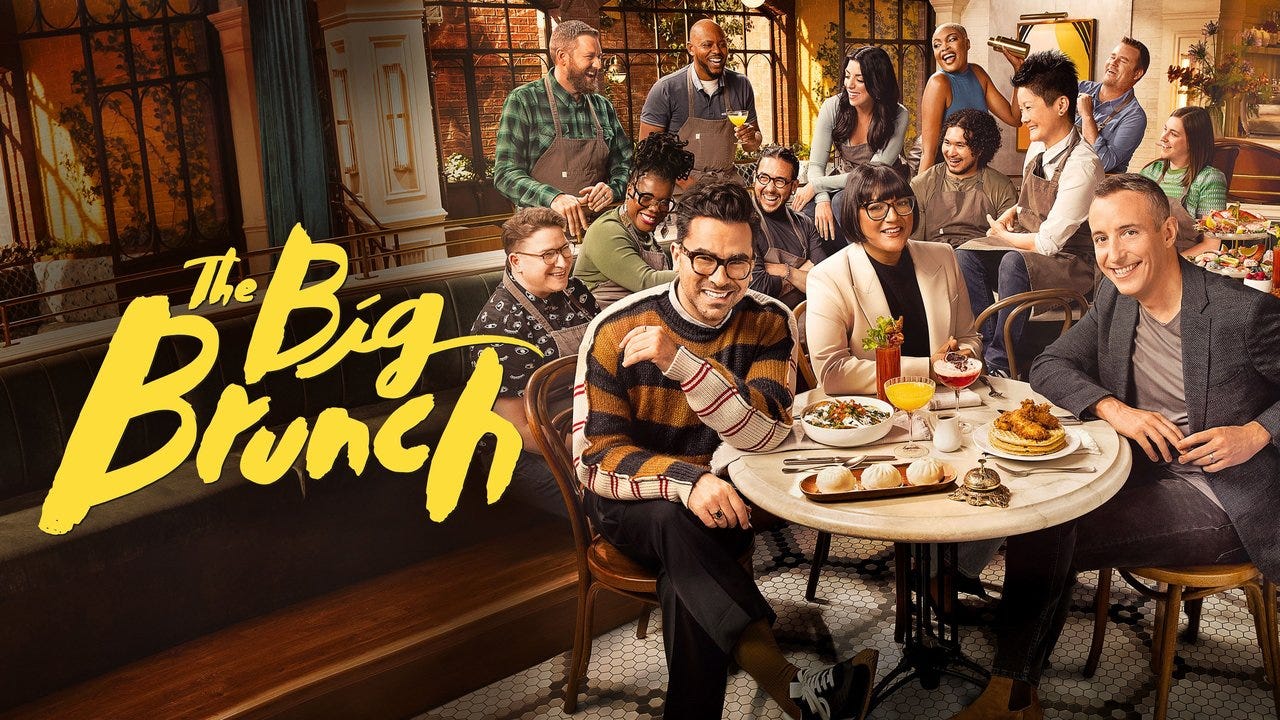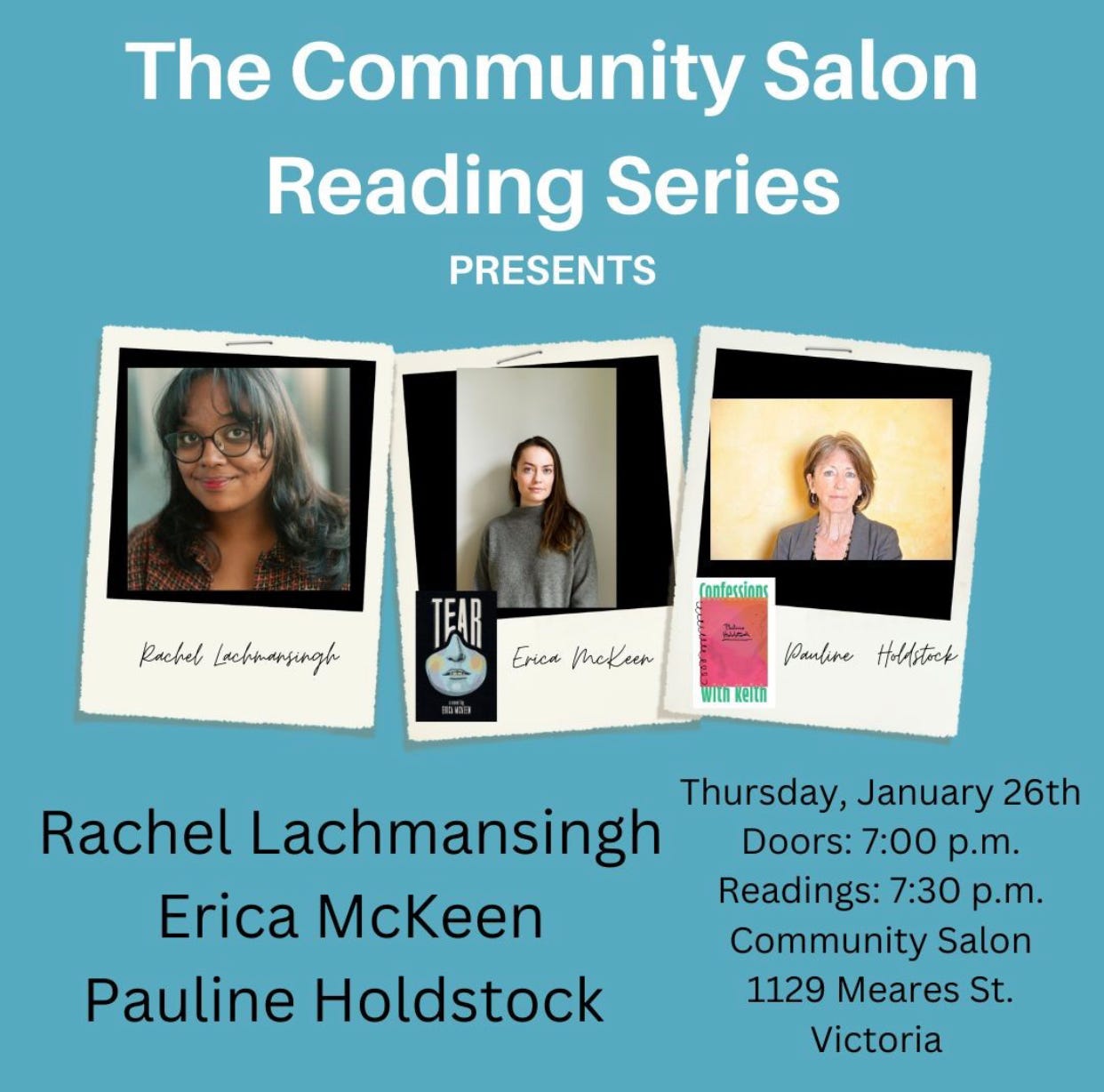I’ve been consuming food-related TV shows since I was a kid. It started with James Barber, but in my teens and 20s I dove headfirst into the world of food competition shows. When Masterchef was at it’s peak it wasn’t uncommon for me to get text messages from friends and family telling me that I should be on the show. When my step son was 5 or 6 we watched hours and hours of Chopped (followed by dance parties to Bruce Springsteen). I’ve watched pretty much every food competition show there is, and I’ve also watched the spin offs produced in other countries (Masterchef Australia is 100% better than the US or Canadian ones.)
Much has been written about the problems of shows like Top Chef, and in their defense, recent seasons have attempted to right the wrongs of past episodes. But it wasn’t until I binge watched The Big Brunch that I realized what was really missing from the competitive food TV world: Love.
If you’re not familiar with The Big Brunch, let me start by telling you I wept tears of joy repeatedly through this show. This is not a common response to shows of this nature, but if you’ve watched Schitt’s Creek, and like me, cried when Patrick sings “Simply the Best” to David, then you too might need a box of Kleenex to watch The Big Brunch. And the reason I bring up Schitt’s Creeks is that The Big Brunch is the brain child of Dan Levy.
The premise is pretty much everything you know from other food shows: 10 chefs compete for an investment of $300,000 to make their culinary dreams come true. Levy serves as both host and judge. The other judges are Sohla El-Waylly and William Guidara. Instead of each contestant coming with a long roaster of awards and Michelin stars, they come with a project or culinary goal they want to achieve. For example: Chef J Chong, a Asheville, NC based chef is bringing traditional Cantonese food and culinary experience to the community with pop-ups.
In the first episode, Levy asks the question “I wonder who the villain’s going to be?” and then answers himself saying, “I feel like it’s going to be us [the judges].” For a longtime consumer of this genre of food TV, I couldn’t have predicted how the show would actively work to dismantle one of the oldest storytelling gimmicks in the book. Whether it’s in dramatizations or reality TV, producers and audiences love a villain, and we love to watch the “good guy” overcome the odds and conquer the villain. It’s that hero’s journey where in order for the hero to be changed, there needs to be a battle of good vs. evil, and good must reign over evil. The reason that The Big Brunch was different was that at no point did they present one of their contestants as a “villain” or a somehow unlikeable character. As the show progresses, the contestants talk about their cohort as a family, and start each day, before the competition starts, with a family meal. The judges cry, the contestants cry. There is a lot of hugging. And ultimately there is love for food, for community, and for each other.
The kitchen hold so much emotion and symbolism. If we’re talking about the restaurant kitchen, the stories I have of this space include misogyny, aggression/violence, and competition. My feelings about my home kitchen are also complicated. As a woman in the kitchen, I’m always butting up the gendered nature of domestic labour, that old “a woman’s place is in the kitchen.” But the truth is, I love my kitchen. I love being in my kitchen. It’s a place that I feel most at ease and most centered. It’s also a place where every day I get to show my love (for myself and others) in an active and actionable way. To share food, to cook food, and to give the gift of delicious and nourish meals to the people in our life is something extremely special, and often taken for granted. It’s no surprise that the cultural dialogue around cooking and food has been polarized. And it’s also no surprise that in a world that has very problematic language and stories around love, that we have stripped love from the kitchen.
It’s easy to become bogged down in all the way that pop culture stays the same, and all the stories that maintain old ideas of love. But I think that would be paying a massive disservice to the LGBTQ2S+, BIPOC, disabled, fat creators that are constantly creating the stories and content that works to dismantle the stories that capitalism, white supremacy, and patriarchy has spent centuries reinforcing. This is exhausting and important work that deserves so much love and gratitude. So, this is me inviting you to spend some time watching The Big Brunch, and don’t forget the Kleenexes. You’ll need them.
Exercise:
The kitchen table is a place where so much happens. Yes, we eat there, but I’ve written at the kitchen table, I’ve played board games there. I’ve folded laundry on it. It’s a gathering place, and a common-ground of sorts. For this month’s writing exercise, I invite you to set a scene or a story at the kitchen table. I approach this scene with love instead of conflict. Many conflicts erupt at the kitchen table (I’m thinking of all the arguments I had with my parents while they tried to help me do my homework at the kitchen table) but this isn’t the assignment. With this exercise, I invite you to bring love into the kitchen.
And for some inspiration, this is a beautiful poem which centers the kitchen table by Joy Harjo.
Events of note:
For more info about this Victoria, BC-based reading series click here.
What I'm reading: I did a lot of reading and knitting over the holidays. I can thank having some time off of work for this. As I’m easing back into the swing of things, my reading has slowed, but this has been nice because I’ve been spending time with some books that seem to demand that I slow down and listen. (Erika Thorkelson wrote a great newsletter about slow reading, check it out here.) The books I’m savouring are: Making Love with the Land by Joshua Whitehead and Monoculture by Sue Goyette.
What’s next on the reading list: I haven’t quite sorted out what I’d like to read next. Part of the reason for this might be is I’m just so happy being with the two books I’m currently reading, that I’m not ready to think of what’s next. I did recently download Fayne by Ann-Marie MacDonald, which I plan to listen to ask I drive to Saskatchewan for my residency and book research.
What I'm watching: Over the holidays, I watched season two of Slow Horses, a spy-drama/comedy with Gary Oldman and Kristen Scott Thomas. My dad and I also enjoyed Severance with Adam Scott and Patricia Arquette. Severance is one of those shows that is unsettling but intriguing enough that you can’t help but watch another episode to see what happened. Oh, and if you need a great quirky comedy I HIGHLY recommend Brian and Charles.
What I'm cooking: My meals had been a bit uninspired, but last night I decided to try a recipe from Vegetables: A Love Story by Renee Kohlmann. I made her Tortellini with Kale and Buttered Bread Crumbs and it was fast and so so delicious.






